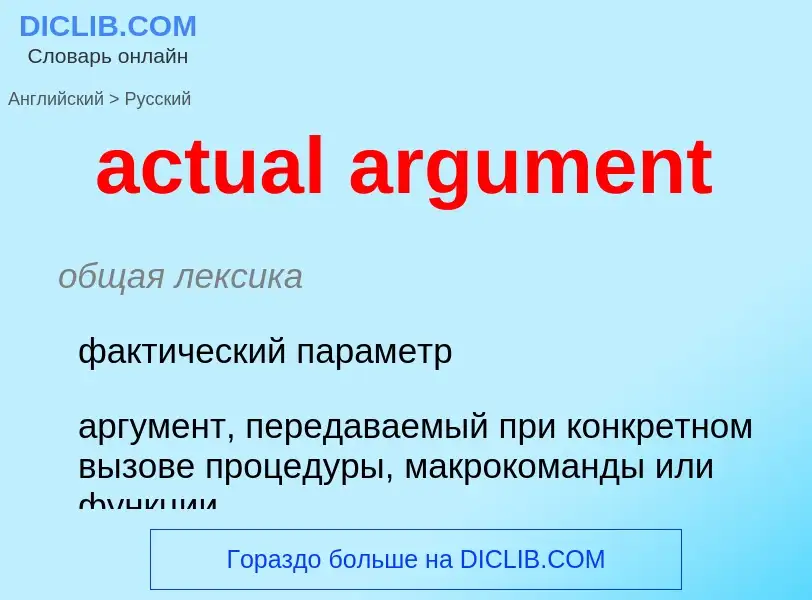Übersetzung und Analyse von Wörtern durch künstliche Intelligenz ChatGPT
Auf dieser Seite erhalten Sie eine detaillierte Analyse eines Wortes oder einer Phrase mithilfe der besten heute verfügbaren Technologie der künstlichen Intelligenz:
- wie das Wort verwendet wird
- Häufigkeit der Nutzung
- es wird häufiger in mündlicher oder schriftlicher Rede verwendet
- Wortübersetzungsoptionen
- Anwendungsbeispiele (mehrere Phrasen mit Übersetzung)
- Etymologie
actual argument - Übersetzung nach Englisch
общая лексика
фактический параметр
аргумент, передаваемый при конкретном вызове процедуры, макрокоманды или функции
синоним
['ɑ:gjumənt]
общая лексика
аргумент, действительный (фактический) параметр
в программировании - параметр (константа, переменная или выражение), передаваемый вызывающей программой функции, процедуре или методу
переключатель, позволяющий пользователю задать конкретные действия или свойства при вызове команды, командного файла или макрокоманды. Синоним - опция
аргумент
логический довод, служащий основанием доказательства
довод
аргумент функции
доказательство
аргументация
(рас)суждение
обсуждение
дискуссия
спор
математика
независимая переменная
синоним
существительное
общая лексика
довод
доказательство
аргумент
аргументация
аргументированное выступление (в защиту чего-л.)
спор
дискуссия
тема или основная идея (литературного произведения)
краткое содержание (книги)
дискуссия, спор
краткое содержание (книги)
логика
средний термин силлогизма
математика
независимая переменная
аргумент, независимая переменная
вычислительная техника
параметр
синоним
Definition
Wikipedia
In linguistics, an argument is an expression that helps complete the meaning of a predicate, the latter referring in this context to a main verb and its auxiliaries. In this regard, the complement is a closely related concept. Most predicates take one, two, or three arguments. A predicate and its arguments form a predicate-argument structure. The discussion of predicates and arguments is associated most with (content) verbs and noun phrases (NPs), although other syntactic categories can also be construed as predicates and as arguments. Arguments must be distinguished from adjuncts. While a predicate needs its arguments to complete its meaning, the adjuncts that appear with a predicate are optional; they are not necessary to complete the meaning of the predicate. Most theories of syntax and semantics acknowledge arguments and adjuncts, although the terminology varies, and the distinction is generally believed to exist in all languages. Dependency grammars sometimes call arguments actants, following Lucien Tesnière (1959).
The area of grammar that explores the nature of predicates, their arguments, and adjuncts is called valency theory. Predicates have a valence; they determine the number and type of arguments that can or must appear in their environment. The valence of predicates is also investigated in terms of subcategorization.



